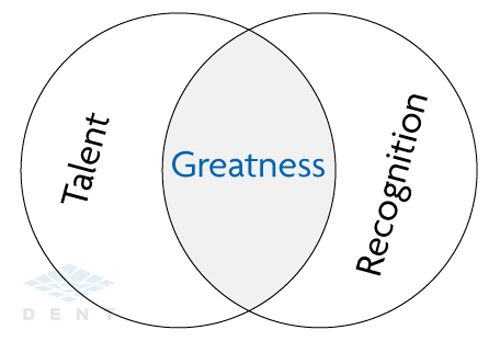Greatness is talent plus recognition
 At Dent each year we spend a lot of time breaking down what it takes to be, for lack of a better term, one of the "greats." Even though it's not well defined, our society seems to have a pretty good consensus on what it is to be great: we all agree there are some great Scientists like Marie Curie, Politicians like Winston Churchill, Entrepreneurs like Elon Musk, Actors like Katharine Hepburn, Musicians like Miles Davis, and so forth.Greatness, I think, is a pretty compelling idea. It has its own attraction, beyond simple wealth or fame. Maybe because of ego. But what makes someone capital-G-Great?I've been searching for a useful framework on which to hang many of these observations, and I think it might be this: greatness equals talent plus recognition.Let's dig into this a little bit to explore the idea and see how other things we already know about might fit in.Firstly, "talent" warrants some definition. I mean talent much the way Howard Gardner means "intelligence". In Gardner's words:
At Dent each year we spend a lot of time breaking down what it takes to be, for lack of a better term, one of the "greats." Even though it's not well defined, our society seems to have a pretty good consensus on what it is to be great: we all agree there are some great Scientists like Marie Curie, Politicians like Winston Churchill, Entrepreneurs like Elon Musk, Actors like Katharine Hepburn, Musicians like Miles Davis, and so forth.Greatness, I think, is a pretty compelling idea. It has its own attraction, beyond simple wealth or fame. Maybe because of ego. But what makes someone capital-G-Great?I've been searching for a useful framework on which to hang many of these observations, and I think it might be this: greatness equals talent plus recognition.Let's dig into this a little bit to explore the idea and see how other things we already know about might fit in.Firstly, "talent" warrants some definition. I mean talent much the way Howard Gardner means "intelligence". In Gardner's words:
To my mind, a human intellectual competence must entail a set of skills of problem solving—enabling the individual to resolve genuine problems or difficulties that he encounters and, when appropriate, to create an effective product—and must also entail the potential for finding or creating problems—thereby laying the groundwork for the acquisition of new knowledge.1
In other words, I mean that a talent is something that you develop, not something you have. This makes a lot of sense to me. Think of how we talk about people with a knack for something: "She has a talent for drawing," or "He has a talent for charming people."Neither of these things (nor any other in a long list of "talents") come pre-equipped, though often those who practice it early and successfully develop their talents so much earlier than their peers that by the time we're paying attention it appears natural.So within this framework of greatness, half of the battle is learning to be really really good at something. When you look at who we consider great, the scope of possible talents for greatness is fairly wide. You can be great at charity work (Mother Theresa), you can be great at war (Napoleon), you can be great at acting (Meryl Streep), you can be great at inventing (Thomas Edison), and so on.The other half of the battle is getting the world to know and care about your talent. There are probably a hundred thousand amateur or semi-professional musicians out there that have the talent to be another Lady Gaga -- but they haven't made the leap to recognition that greatness requires.Now looking through this lens, we can start to file the techniques, books, frameworks, and lectures that inform our quest for greatness into one of two categories: those that help us develop our talent, and those that help us develop our recognition.At a glance, this seems like a useful division, though sometimes a circular one (where something that develops a talent is developing a talent that will help you become known -- a good example of this is The Charisma Myth, a book teaching the aspects of charisma).So where do some common examples fit -- books, blogs, brainiac theories?Talent
- Robert Greene's Mastery
- Creativity Inc from Ed Catmull
- Farnam Street from Shane Parish
- The Innovator's Dilemma from Clay Christensen
Recognition
- The Charisma Myth from Olivia Fox Cabane
- Influence from Robert Cialdini
- Gladwell's both loved and hated Tipping Point
- Research into Managerial Mystique from Denter Maia Young
Note: this list is hardly exhaustive, it's just a reflection of what's been floating around in my brain recently.These are all new thoughts to me, and untested. I'm very interested in hearing what you think about these ideas, whether they're useful, interesting, old news, boring, or anything in between. Feel free to email me your thoughts, or preferably, write up your own post in response (on medium if you have no blog). If you really want to, you can of course just leave a comment.1 Gardner, Howard (2011-03-29). Frames of Mind: The Theory of Multiple Intelligences (pp. 64-65). Basic Books. Kindle Edition.
